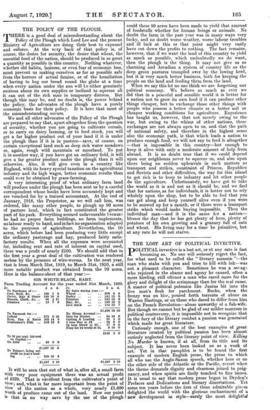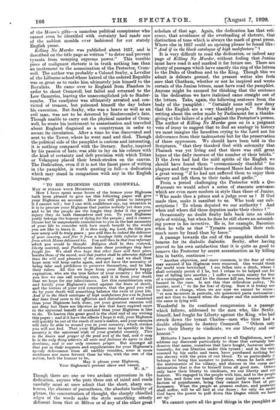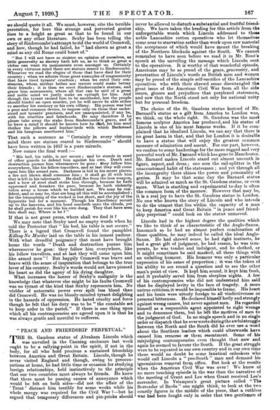THE LOST ART OF POLITICAL INVECTIVE.
POLITICAL invective is a lost art, or at any rate is fast becoming so. No one will seriously regret the fact, for what used to be called the "literary assassin "—the man who stabs with pen and tries to kill with ink—was not a pleasant character. Sometimes he was a savag3 who rejoiced in the shame and agony he caused, often a mere hireling, still oftener a man who cared more for the glory and delight of the scrimmage than for the real cause. A master of political polemics like Junius bit into the live man's flesh for parchment. Burke, when the frenzy was on him, poured forth torrents of abuse on Warren Hastings, or on those who dared to differ from him on the French Revolution—abuse unworthy of a fish-wife. But though we cannot but be glad of our milder manners in political controversy, it is impossible not to recognize that in the fury of the literary combat a passion was generated which made for great literature. Curiously enough, one of the best examples of great literature created by political passion has been almost entirely neglected from the literary point of view. Killing No Murder is known, if at all, from its title and its subject. It has never been looked on as a work of art. Yet in that pamphlet is to be found the first example of modern English prose, the prose to which all who use the Anglo-Saxon speech, whether here or on the other side of the Atlantic or the Pacific, revert when the theme demands dignity and clearness joined to poig- nancy, and when spirits are finely touched to fine issues. It is usual to say that modern prose began in Dryden's Prefaces and Dedications and literary dissertations. Yet some ten years before the first of these admirable pieces delighted the world with the glorious enchantment of a of the Muses's gifts—a nameless political conspirator who cannot even be identified with certainty had made one of the noblest moulds ever fashioned for our stately English prose. Killing No Murder was published about 1657, and is described on the title page as written" to deter and prevent tyrants from usurping supreme power." This terrible piece of malignant rhetoric is in truth nothing less than an incitement to the assassination of the Protector, Crom- well. The author was probably a Colonel Sexby, a Leveller of the Lilburne school whose hatred of the ordered Republio was so great as to make him ultimately join himself to the Royalists. He came over to England from Flanders in order to shoot Cromwell, but failed and returned to the Low Countries, leaving the unaccomplished job to Binder- combo. The coadjutor was ultimately arrested and con- victed of treason, but poisoned himself the day before his execution. But Sexby, who was a brave as well as an evil man, was not to be deterred by Sindercombe's fate. Though unable to carry out the physical murder of Crom- well, he wrote his incitement to assassination and travelled about England disguised as a countryman in order to secure its circulation. After a time he was discovered and sent to the Tower, where he went mad and died. Though the politicalaide of the pamphlet is curious and interesting, it is nothing compared with the literary. Sexby, inspired by his passion of hate, was able to lay on his colours with the kind of certainty and deft precision with which Titian or Velazquez placed their brush-strokes on the canvas. The Dedication, even if it is not the finest piece of writing in the pamphlet, is worth quoting in full—a dedication which may stand in comparison with any in the English language.
"TO HIS HIGHNESS OLIVER CROMWELL. MAY IT PLEASE YOUR HIGHNESS,
How I have spent some hours of the leisure your Highness hath been pleased to give me this following paper will give your Highness an account. How you will please to interpret it I cannot tell ; but I can with confidence say, my intention in it is to procure your Highness that justice nobody yet does you, and to let the people see the longer they defer it the greater injury they do both themselves and you. To your Highness justly belongs the honour of dying for the people ; and it cannot choose but be unspeakable consolation to you in the last moments of your life to consider with how much benefit to the world you are like to leave it. It is then only, my Lord, the titles you now usurp will be truly yours ; you will then be indeed the deliverer of your country, and free it from a bondage little inferior to that from which Moses delivered his. You will then be that true reformer which you would be thought. Religion shall be then restored, liberty asserted, and Parliaments have those privileges they have fought for. We shall then hope that other laws will have place besides those of the sword, and that justice Mall be otherwise defined than the will and pleasure of the strongest ; and we shall then hope men will keep oaths again, and not have the necessity of being false and perfidious to preserve themselves, and be like their rulers. All this we hope from your Highness's happy expiration, who are the true father of your country ; for while you live we can call nothing ours, and it is from your death that we hope for our inheritances. Let this consideration arm and fortify your Highness's mind against the fears of death, and the terrors of your evil conscience, that the good you will do by your death will something balance the evils of your life. And if in the black catalogue of high malefactors few can be found that have lived more to the affliction and disturbance of mankind than your Highness hath done, yet your greatest enemies will not deny but there are likewise as few that have expired more to the universal benefit of mankind than your Highness is like to do. To hasten this great good is the chief end of my writing this paper ; and if it have the effects I hope it will, your Highness will quickly be out of the reach of men's malice, and your enemies will only be able to wound you in your memory, which strokes you will not feel. That your Highness may be speedily in this security is the universal wish of your grateful country. This is the desire and prayer of the good and of the bad, and it may be is the only thing wherein all sects and factions do agree in their devotions, and is our only common prayer. But amongst all that put in their requests and supplications for your Highness's speedy deliverance from all earthly troubles, none is more assiduous nor more fervent than he who, with the rest of the nation, hath the honour to be, May it please your Highness, Your Highness's present slave and vassal, W. A."
Though there are one or two archaic expressions in the dedication, anyone who puts these out of mind and reads carefully must at once admit that the short, sharp sen- tences, the absence of parentheses, the absolute lucidity of phrase, the concentration of thought, the sharply chiselled edges of the words make the style something utterly different from that of- Milton or of any of the other great scholars of that age. Again, the dedication has that reti- cence, that avoidance of the overloading of rhetoric, that distinction of tone which is always the mark of great prose: Where else in 1657 could an opening phrase be found like : " And if in the black catalogue of high malefactors" V It is very difficult to read the dedication, or indeed any page of Killing No Murder, without feeling that Junius must have read it and marked it for future use. There are plenty of passages which have exactly the ring of the letters to the Duke of Grafton and to the King. Though this we admit is delicate ground, the present writer also feels sure that Chatham., whether or not he inspired and wrote certain of the Junius letters, must have read the pamphlet. Anyone might ba excused for thinking that the sentence in the dedication we have italicised came straight out of the letters. Take, again, the following sentence from the body of the 'pamphlet: "Certainly none will now deny that the English are a very thankful people." Sexby is writing about the order made by Parliament for a thanks- giving at the failure of a plot against the Protector's person. The author of Killing No Murder goes on in a poignant vein of irony to suggest that to find an analogy in history we must imagine the Israelites crying to the Lord not for deliverance from their taskmasters but for the preservation of those oppressors. We should have been told in the Scriptures, "that they thanked God with solemnity that Pharaoh was yet living and that there was still great hopes of the daily increase of the nuraber of their bricks." If the Jews had had the mild spirits of the English we should have found them "ceremoniously thankful" for plagues and they would have deemed Moses had done them a great wrong' if he had not suffered them to enjoy their slavery and left them to their tasks and garlic."
From a period challenging the Protector with a Quo Warrant° we would select a series of staccato sentence3 which are even more modern in style than those of Junius. "Who made thee a prince and a judge over us ? If God. made thee, make it manifest to us. Who took our sub- scriptions? To whom deputed we our authority ? And- when and where did these deputies make their choice ? "
Occasionally no doubt Sexby falls back into an older style of writing, but when he does he still shows an astonish- ing power in his invective. He is, for example, Baconian when he tells us that "Tyrants accomplish their ends much more by fraud than by force." A passage towards the end of the pamphlet should be famous for its diabolic dialectic. Sexby, after having proved to his own satisfaction that it is quite as good to remove the Protector by secret assassination as by killing him in battle, continues :— " Another objection, and more common, is the fear of what may succeed if his Highness were removed. One would think the world were bewitched. I am fallen into a ditch, where I shall certainly perish if I lie, but I refuse to be helped out for fear of falling mto another ; I suffer a certain misery for fear of a contingent one, and let the disease kill me, because there is hazard in the cure. Is not this that ridiculous policy, Ne moriar, mori ; " to die for fear of dying. Sure it is frenzy not to desire a change, when we are sure we cannot be worse ; "et non incurrere in pericula, ubi quiescenti paria metuuntur ; and not then to hazard when the danger and the mischiefs are the same in lying still.
Wonderful in its continued compression is a passage which follows, addressed to the men who, like Sexby, himself, had fought tor Liberty against the King, who had struck down the tyrant Charles—men Who thus had a double obligation to destroy Cromwell. "Others only have their liberty to vindicate, we our liberty and our honour."
Hitherto I have spoken in general to all Englishmen, now I address my discourse particularly to those that certainly best deserve that name, ourselves thati have fought, however unfor- tunately, for our liberties under this tyrant ; and in the end, cozened by his oaths and tears, have purchased nothing but
our slavery with the price of our blood. To us particularly itbelongs to bring this monster to justice, whom he hath reads the instruments of his villany, and sharers in the curse and detestation that is due to himself from all good men. Others only have their liberty to vindicate, we our liberty and our honour. We engaged to the people with him, and to the people for him, and from our hands they may justly expect a satis- faction of punishment, being they cannot have that of per- formance. What the people at present endure, and posterity shall suffer, will be all laid at our doors : for only we under God have the power to pull down this Dagon which we have set up."
We cannot quote all the, good things in the pamphlet or we should quote it all. We must, however, cite the terrible peroration, for here this strange and perverted genius rises to a height as great as that to be found in our own or any other literature. Sexby has been telling the story of Sindercombe's attempt to rid the world of Cromwell, and how, though he had failed, he "had shown as great a mind as any old Rome could boast of."
" But I will not have so sinister an opinion of ourselves, as little generosity as slavery hath left us, as to think so great a virtue can want its monuments even amongst us. Certainly in every virtuous mind there are statues reared to Sindercombe. Whenever we read the elegies of those that have died for their country ; when we admire those great examples of magnanimity that have tired tyrants' cruelties ; when we extol their con- stancies, whom neither bribes nor terrors could make betray their friends ; it is then we erect Sindercombe's statues, and grave him monuments, where all that can be said of a great .and noble mind we justly make an epitaph for him. And though the tyrant caused him to be smothered, lest the people should hinder an open murder, yet he will never be able either to smother his memory or his own villany. His poison was but a poor and common device, to impose only on those that under- stood not tyrants' practices, and are unacquainted, if any be, with his cruelties and falsehoods. He may therefore if he please take away the stake from Sindercombe's grave, and if he have a mind it should be known how he died, let him send thither the pillows and feather-beds with which Barkstead and his hangman smothered him."
That such a sentence as "Certainly in every virtuous mind there are statues reared to Sindercorabe " should have been written in 1657 is a pure miracle.
Now comes the final word :— " His bed, his table, is not secure ; and he stands in need of other guards to defend him against his own. Death and destruction pursue him wheresoever he goes : they follow him everywhere, like his fellow-travellers, and at last they will come upon him like armed men. Darkness is hid in his secret places; a fire not blown shall consume him - it shall go ill with him that is left in his tabernacle. He shall flee from the iron weapon, and a bow of steel shall strike him through, because he hath oppressed and forsaken the poor, because he hath violently taken away a house which he builded not. We may be con- fident, and so may he, that ere long all this will be accomplished for the triumphing of the wicked is but short, and the joy of the hypocrite but for a moment. Though his Excellency mount up to the heavens, and his head reacheth unto the clouds, yet he shall perish for ever like his own dung. They that have seen him shall say, Where is he ? "
If that is not great prose, where shall we find it ?
We may note that Sexby used no empty words when he told the Protector that "his bed, his table is not secure." There is a legend that Cromwell found the pamphlet Killing No Murder laid on the table in his inmost parlour. With what dreadful poignancy that must have brought home the words "Death and destruction pursue him wheresoever he goes : they follow him everywhere, like his fellow travellers, and at last they will come upon him Ike armed men" ! But happily Cromwell was brave and brave with the sense of inspiration that belongs to the true lover of his country. Sexby'a words would not have pierced his heart as did the agony of his dying daughter. What increases the horror of Sexby's malignity is the knowledge that whatever else might be his faults Cromwell was no tyrant of the kind that Sexby represents him. No wielder of autocratic power ever spilt less blood than did Cromwell. He was no bloody-minded tyrant delighting in the hazards of oppression. He hated cruelty and force though he felt that his duty was to be •" the constable set to keep order in the parish." If there is one thing upon which all his contemporaries are agreed upon it is that he was always gentle and merciful to sufferers.




































 Previous page
Previous page